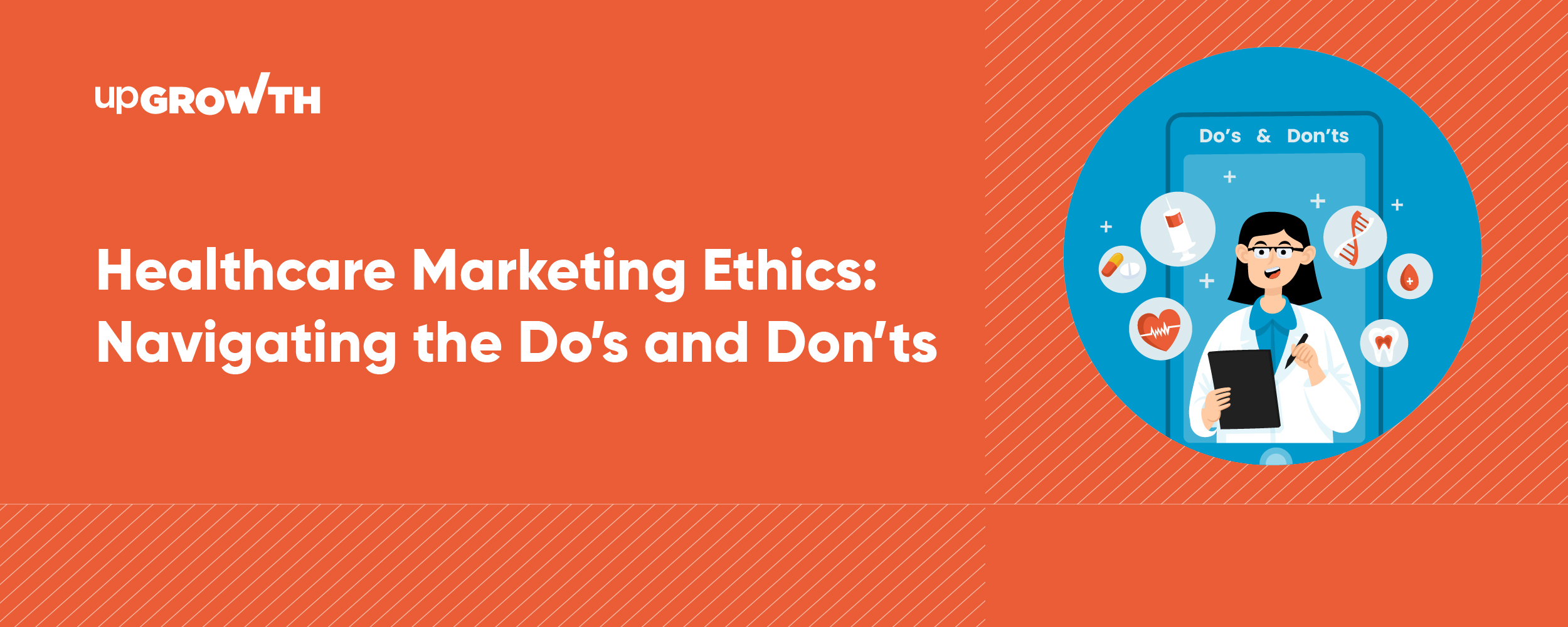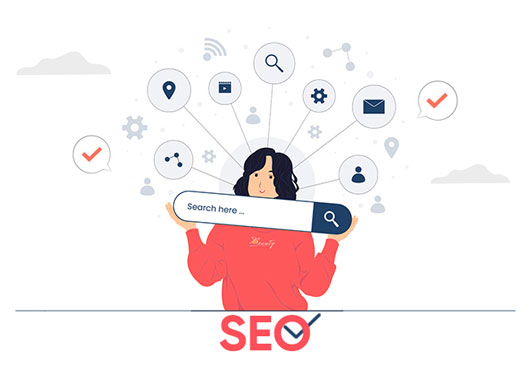Healthcare Marketing Ethics: Navigating the Do’s and Don’ts
Contributors:
Amol Ghemud
Published: February 22, 2024

Summary
Let’s delve into the critical importance of ethics in healthcare marketing, emphasizing trust, transparency, and patient empowerment. It outlines specific ethical practices that should be followed, such as prioritizing truthfulness, respecting patient privacy, and avoiding exaggerated claims. Additionally, it warns against exploiting patient vulnerabilities and engaging in unfair comparisons. The piece concludes by highlighting the role of ethical marketing in building a healthier future and maintaining the integrity of the healthcare industry.
The healthcare industry, by its very nature, carries inherent sensitivities. Unlike selling a gadget or trendy apparel, healthcare providers are entrusted with promoting sensitive services that impact people’s well-being. This necessitates a heightened awareness of healthcare marketing ethics and a commitment to ethical issues in healthcare marketing.
When it comes to marketing within this space, the stakes are even higher. While ethical marketing practices are crucial across all industries, in healthcare, navigating the “do’s and don’ts” becomes paramount.
The Ethical Imperative:
Imagine a patient searching for potentially life-changing treatment options. Their vulnerability is immense, and trust becomes a sacred currency. This is precisely why ethics in healthcare marketing transcends mere compliance; it’s about responsible communication that prioritizes patient well-being.
The healthcare industry occupies a unique and sensitive space within the marketing realm, and this inherent sensitivity elevates the importance of ethics in healthcare marketing.
Here’s why ethical considerations become absolutely paramount:
1. The Fragile Trust Factor:
In healthcare, trust isn’t just a marketing metric; it’s the lifeblood of a patient-provider relationship. Patients entrust healthcare professionals with their well-being, often during their most vulnerable moments. Marketing that employs deception, fear-mongering, or exaggerated claims erodes this trust, potentially leading to delayed diagnoses, poor treatment choices, and even harm. Upholding ethical principles fosters transparency and honesty, building the foundation for strong, long-lasting patient relationships.
2. Navigating the Minefield of Vulnerabilities:
Illness and medical concerns expose individuals to a heightened state of vulnerability. Exploiting these vulnerabilities for marketing gains is not only unethical but also deeply exploitative. Marketing tactics that prey on anxieties, manipulate emotions, or leverage misinformation are not only morally wrong but also counterproductive. Ethical marketing acknowledges and respects patient vulnerabilities, focusing on empowerment through education and building trust through genuineness.
3. The Power of Influence and Misinformation:
Healthcare marketing has the potential to impact public health perceptions and behaviours significantly. Unethical practices, such as promoting unproven treatments or downplaying potential risks, can have ripple effects, misleading individuals and hindering informed decision-making. Embracing ethical principles ensures information dissemination is accurate, balanced, and aligned with evidence-based medical practices, contributing to responsible public health outcomes.
4. Maintaining the Integrity of the Profession:
Unethical marketing practices harm individual patients and erode public trust in the entire healthcare profession. By adhering to ethical codes and prioritizing responsible communication, healthcare marketers can help preserve the integrity and reputation of the field. This fosters a more sustainable and trustworthy healthcare ecosystem, benefiting patients and providers.
5. The Responsibility to Do No Harm:
The principle of “do no harm” isn’t confined to clinical settings; it also extends to marketing practices. Unethical marketing can cause harm by misleading patients, delaying diagnoses, or promoting harmful interventions. Prioritizing ethics ensures marketing efforts align with the core values of healthcare – promoting well-being, respecting autonomy, and prioritizing patient safety above all else.
Ethical Compliance: Navigating the Indian Healthcare Marketing Landscape
Ethical healthcare marketing in India requires navigating a complex mix: regulations, cultural nuances, and evolving best practices. Here’s a breakdown:
Regulations:
- IMCR, D&MR Act, CPA: These dictate ethical advertising, data privacy, and consumer protection.
- PDP Bill (pending): Will set robust data privacy frameworks.
Ethical Best Practices:
- Transparency, Patient Respect, Responsible Claims: Uphold truthfulness, data privacy, and evidence-based claims.
- Cultural Sensitivity, Empowerment, Collaboration: Consider diverse beliefs, educate patients, and partner with healthcare professionals.
By understanding and proactively addressing these aspects, healthcare marketers in India can ensure ethical compliance, build trust, and empower informed healthcare decisions. But, how do you navigate this often-murky terrain?
Let’s delve into the essential do’s and don’ts of ethical healthcare marketing:
Do:
Prioritize Transparency and Truthfulness:
Building trust is paramount. Ensure all marketing materials, from website copy to social media posts, are factually accurate, transparent, and avoid misleading claims. Ethical issues in marketing often stem from embellishments or omissions, so be upfront and honest about your services and their limitations.
Respect Patient Privacy:
DISHA regulations are sacrosanct. Never share patient information without explicit consent, and ensure data security measures are robust. Consider anonymizing success stories or testimonials to protect identities.
Focus on Patient Empowerment:
Instead of fear-mongering tactics, empower patients with knowledge. Educate them about their health conditions, treatment options, and the value your services offer. This approach aligns with the core principles of marketing ethics.
Embrace Diversity and Inclusion:
Healthcare isn’t one-size-fits-all. Ensure your marketing materials reflect the diversity of your patient population and avoid discriminatory language or imagery.
Collaborate with Healthcare Professionals:
Building relationships with doctors, nurses, and other healthcare professionals can lend credibility and authenticity to your marketing efforts. Seek their insights and collaborate on messaging that aligns with their ethical standards.
Don’t:
Make Exaggerated Claims or Guarantees:
Desperate promises of miracle cures or unrealistic results erode trust and violate ethical issues in healthcare marketing. Stick to evidence-based claims and focus on the genuine benefits you offer.
Exploit Vulnerabilities:
Preying on patients’ anxieties or fears is unethical and ineffective. Avoid sensationalizing health issues or using manipulative tactics to drive conversions.
Engage in Unfair Comparisons:
Focus on showcasing your own strengths instead of denigrating competitors. Ethical issues in marketing frequently arise from negative comparisons that mislead consumers.
Neglect Accessibility:
Ensure your marketing materials are accessible to everyone, regardless of disability or technological limitations. Consider offering alternative formats like audio recordings or transcripts for written content.
Disregard Professional Codes of Conduct:
Many healthcare professions have established ethical codes. Familiarize yourself with relevant codes and ensure your marketing activities comply with them.
Conclusion: Cultivating a Conscience in Healthcare Marketing
The path of ethical healthcare marketing can be challenging. It demands constant vigilance, unwavering transparency, and a deep-seated commitment to putting patient well-being above all else.
However, the rewards are immeasurable. By navigating the “do’s and don’ts” with a clear conscience, you contribute to a healthcare landscape where trust flourishes, patients feel empowered, and the industry’s integrity remains unsullied.
Remember, ethical marketing isn’t just good business; it’s a vital step toward building a healthier future. Let’s not just promote healthcare; let’s encourage it ethically.
FAQs
- What are the key ethical considerations in healthcare marketing?
- Transparency and truthfulness: Always be accurate, avoid misleading claims, and respect patient privacy.
- Patient empowerment: Focus on education, not fear, and empower patients with knowledge and informed choices.
- Respect and diversity: Avoid discriminatory language, embrace inclusivity, and consider diverse needs.
- Collaboration and authenticity: Partner with healthcare professionals, ensure messaging aligns with their ethics.
- Responsible claims and comparisons: Avoid exaggerations, guarantees, or negative comparisons.
2. How can healthcare providers ensure their marketing practices are ethically sound?
- Adhere to professional codes of conduct: Familiarize yourself and your team with relevant guidelines.
- Implement robust data security measures: Protect patient information and comply with DISHA regulations.
- Obtain informed consent for marketing activities: Be transparent about data usage and respect patient choices.
- Regularly review and update marketing materials: Ensure they remain accurate, ethical, and inclusive.
- Seek feedback from patients and healthcare professionals: Gain valuable insights and perspectives.
3. What are some common ethical pitfalls in healthcare marketing?
- Exploiting patient vulnerabilities: Avoid preying on anxieties or fears for marketing gains.
- Making exaggerated or unsubstantiated claims: Stick to evidence-based information and avoid guarantees.
- Engaging in unfair comparisons: Focus on your own strengths and avoid denigrating competitors.
- Ignoring accessibility considerations: Ensure marketing materials are accessible to everyone.
- Neglecting patient privacy: Uphold data security and obtain informed consent for marketing activities.
4. How do regulations impact ethical marketing practices in healthcare?
- Regulations like DISHA set minimum standards for data privacy and patient information protection.
- Transparency is key to ethical marketing, ensuring patients understand how their data is used and have control over their choices.
- Marketing materials should be clear, concise, and avoid jargon to facilitate understanding.
5. What is the role of transparency in healthcare marketing?
- Regulations like DISHA set minimum standards for data privacy and patient information protection.
- Transparency is key to ethical marketing, ensuring patients understand how their data is used and have control over their choices.
- Marketing materials should be clear, concise, and avoid jargon to facilitate understanding.
6. How can healthcare marketers balance promotional activities with patient welfare?
- Focus on genuine benefits and value your services offer, not just hype or sales tactics.
- Prioritize patient education and empowerment through informative content and resources.
- Partner with healthcare professionals to ensure marketing aligns with ethical patient care practices.
- Promote responsible health behaviors and avoid sensationalizing health issues.
7. What ethical guidelines should be followed when marketing to vulnerable populations?
- Be mindful of cultural sensitivities and avoid exploiting vulnerabilities or power imbalances.
- Ensure marketing materials are accessible and culturally appropriate.
- Partner with community organizations and trusted leaders to reach vulnerable populations ethically.
- Focus on empowerment and education, providing resources and support rather than just promoting services.
8. How can healthcare organizations maintain patient privacy in their marketing efforts?
- Comply with all relevant data privacy regulations like DISHA.
- Obtain informed consent for data collection and use.
- Implement robust data security measures to protect patient information.
- Be transparent about how patient data is used and stored.
- Avoid sharing patient information without explicit consent.
Read More:
Navigating Market Failures in Healthcare: Innovative Solutions with upGrowth
Digital Marketing in Healthcare: Bridging the Gap between Healthcare Providers and Patients
Content Marketing for Health Care Providers: Best Practices
Best Healthcare Digital Marketing Agencies in India 2024: Our Comprehensive Guide
Benefits of Inbound Marketing for Healthcare industry
Strategic Spending in Healthcare Marketing: Where to Allocate Your Budget
About the Author
Optimizer in Chief
Amol has helped catalyse business growth with his strategic & data-driven methodologies. With a decade of experience in the field of marketing, he has donned multiple hats, from channel optimization, data analytics and creative brand positioning to growth engineering and sales.
 Growth Strategy and Planning
Growth Strategy and Planning Inbound Growth
Inbound Growth Growth Hacking
Growth Hacking Search Engine Optimization
Search Engine Optimization Paid and Performance Marketing
Paid and Performance Marketing Social Media Marketing
Social Media Marketing AI-Driven Growth Strategy
AI-Driven Growth Strategy AI-Native Workflow Automation
AI-Native Workflow Automation Generative Engine Optimization
Generative Engine Optimization

 Marketing Decision Tree
Marketing Decision Tree Case Study
Case Study Tools
Tools Growth Tools
Growth Tools Custom GPT's
Custom GPT's


















Leave a Reply